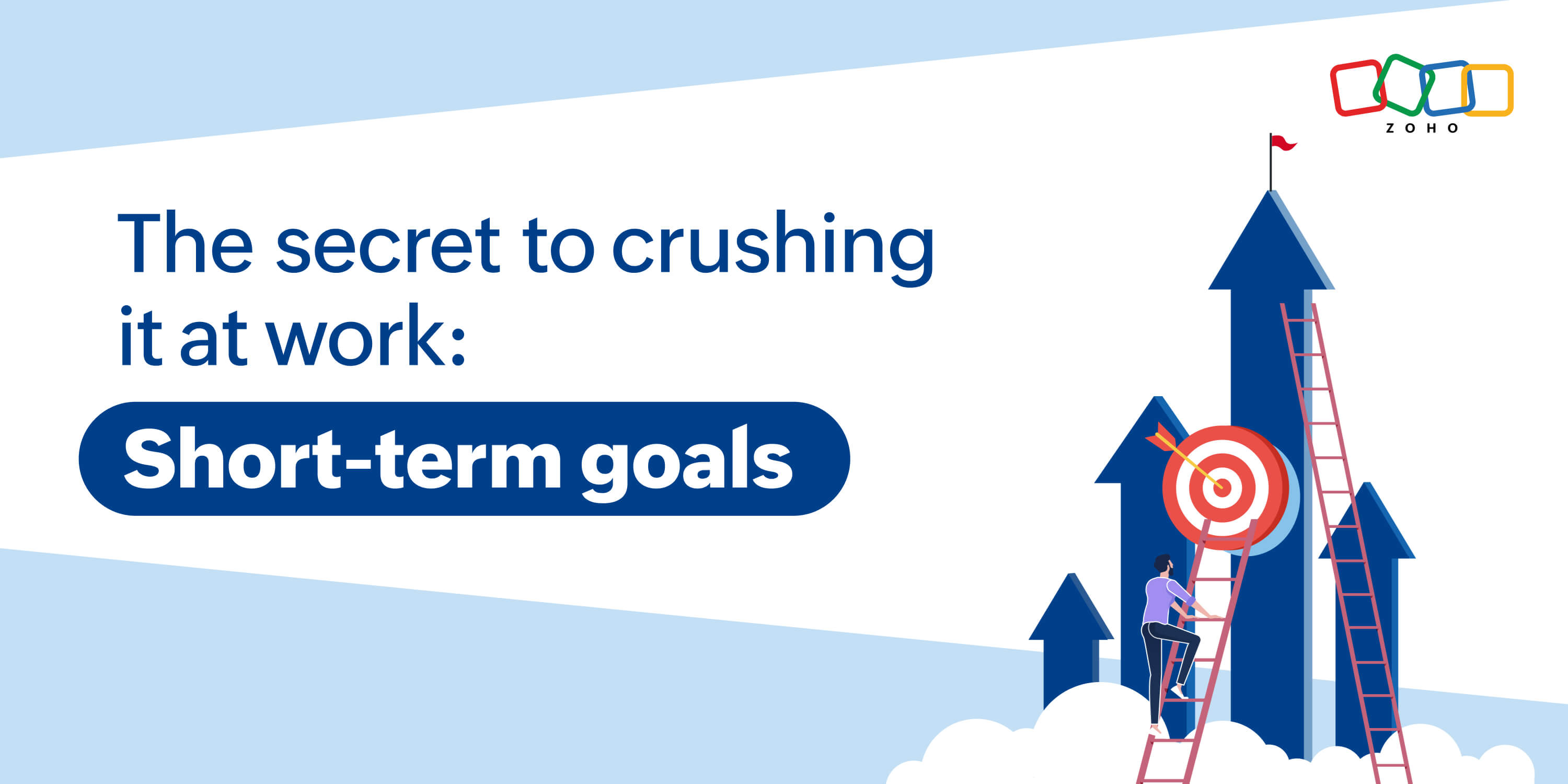- HOME
- All Topics
- Productivity in the workplace
- The secret to crushing it at work: Short-term goals
The secret to crushing it at work: Short-term goals
- Published : April 30, 2025
- Last Updated : April 30, 2025
- 9 Views
- 5 Min Read
Introduction
Let’s be honest.
We’ve all had those days at work where everything feels like one big, tangled ball of chaos. You sit down with your coffee, glance at your calendar, and suddenly feel like you’re being chased by deadlines, tasks, and meetings that popped out of nowhere. Somewhere between the Monday morning stand-up and the Friday wrap-up, your big goals start feeling like faraway dreams on a distant planet.
You’ve probably heard it all before: “Think big!” “Have a vision!” “Chase long-term success!”
Sure, dreaming big is essential. But let’s be honest. When your inbox is exploding, your manager just added another “quick task,” and you’re silently screaming into your laptop, big dreams won’t save you.
What will? Short-term goals.

Short-term goals are the real MVPs. The unsung heroes of our work life. The bite-sized, manageable, sanity-saving checkpoints that get you through the week—sometimes even the day.
If long-term goals are like building a skyscraper, short-term goals are the scaffolding. It's the structure that lets you climb steadily, fix things as you go, and, most importantly, not fall flat on your face.
In this article, we’ll unpack the beauty and brilliance of short-term goals: how they work, why they matter, and how to use them to stop feeling overwhelmed and start feeling like you're on top of things.
Ready to trade stress for structure? Let’s get into it.
Why short-term goals matter
Everyone loves to dream about the future.
“One day, I’ll be a director.”
“One day, I’ll run my own team.”
“One day, I’ll actually clear my inbox.”
(Okay, maybe that last one is just me.)
The truth is, big dreams are exciting. They light a fire in you. But when it comes to actually getting things done, it’s the small, deliberate steps that carry you across the finish line.
That’s where short-term goals step into the spotlight.
Short-term goals act like your personal GPS at work.
When you’re stuck in the daily traffic jam of tasks, meetings, emails, and unexpected fires to put out, short-term goals gently (or sometimes urgently) whisper, “Turn left here.” “Take the next right.” “Exit in 300 meters.”
They keep you moving, adjusting, and progressing, no matter how wild the day gets.
Here’s why they’re absolutely non-negotiable.
They give you clarity when chaos hits.
When you're pulled in five directions, a clearly defined short-term goal cuts through the noise. It’s your North Star in the middle of a blizzard of busywork.
They boost your motivation by making progress visible.
There’s something deeply satisfying about checking off a goal, no matter how small it is. It’s like a little internal high-five that says, "You’re doing it. Keep going."
They create momentum you can actually ride.
One small win leads to another. Suddenly, you're no longer dragging yourself to the finish line; you're sprinting toward it without even realizing it.
They help you adapt on the fly.
When priorities change (because they will), short-term goals are easier to tweak and realign compared to rigid, hefty plans.
They reduce burnout.
Instead of feeling like you’re carrying the whole mountain on your back, you’re just moving one rock at a time. That's way easier on your soul—and your sanity.
The workplace arena: Where short-term goals shine
Let’s meet a few fictional (but oh-so-real) colleagues to make this a little less theoretical.
Maya the marketer: Taming the campaign monster
Maya's team has been tasked with launching a massive product campaign. The launch date is three months away. Maya could just block her calendar for the next 90 days and hope for the best, or she could break it down into smaller pieces.
Her short-term goals for the first two weeks?
- Finalize the messaging brief.
- Approve the design mock-ups.
- Create a 10-slide pitch deck for stakeholders.
She’s not trying to “complete the entire campaign" right now. She's aiming to set the foundation.
Result: Less panic, more progress.
Dan the developer: Slaying bugs and deadlines
Dan’s team has a software release coming up. The bug list is longer than his arm. Instead of feeling overwhelmed, Dan sets mini-goals every morning:
- Close five bugs before lunch.
- Review code for at least two pull requests.
- Document one tricky bug fix by the end of the day.
Result: By the end of the week, Dan doesn’t just survive; he looks like a productivity wizard.
Hannah the HR manager: Winning at recruitment
Hannah needs to hire 10 people in two months. She could spiral into LinkedIn chaos, or she could pace herself.
Her short-term goals:
- Schedule interviews for at least five candidates this week.
- Draft a social post for recruitment campaigns.
- Update the careers page by Friday.
Result: She takes small steps, but each one is critical.
How to set brilliant short-term goals (without rolling your eyes)
Alright, so we agree that short-term goals are important.
But how do you actually set good ones? You know, the kind that work instead of just ending up as another line on your abandoned to-do list?
First things first: Short-term goals aren't just "smaller" goals.
They're smarter. Sharper. Hungrier. They don’t just sit there looking pretty. They pull you forward—sometimes dragging you if needed.
So let’s break down how you can set goals that are actually useful, and not just wishful thinking scribbled in a notebook.
Be specific (like, really specific)
Instead of saying, “I’ll work on the report,” say, “I’ll finish drafting the executive summary for the report by Thursday at 3:00 PM.”
Specific goals give you clear finish lines. Vague ones just give you anxiety.
Make it measurable
If you can’t measure it, you’ll never know if you’ve crushed it.
Set goals where success is obvious. Look at the difference between “Email the revised proposal to the client before Friday noon” instead of “Work on client stuff.”
“Client stuff” is a bottomless pit. “Email proposal” is a target.
Timebox it
Deadlines aren't evil. They're the reason anything gets done.
Give every short-term goal a clear timeline, whether it’s "by the end of the day," "by next Tuesday," or even "in the next two Pomodoro sessions."
Tie it to a bigger picture
Short-term goals should feel like pieces of a larger puzzle, not random Lego blocks scattered on the floor.
Ask yourself: "How does this task move me closer to that big win I’m aiming for?"
If it doesn’t, maybe it’s just busywork disguised as important work.
Keep it realistic
Yes, ambitions are great. But burnouts aren’t. You don’t get extra points for setting 27 goals a day and finishing none. Set goals that push you a little, not ones that stretch you so far you break.
Prioritize ruthlessly
Not all short-term goals are created equal. Focus on the ones that have real impact—the ones your future self will high-five you for doing today.
Wrapping up
Think of it this way: Long-term goals are like climbing Mount Everest.
Short-term goals? They’re the campfires you set up along the way, where you rest, recharge, and figure out your next best move without freezing to death on the side of the mountain.
In other words, you don’t get to the top without them.
In the workplace and in life, the people who move fastest and smartest aren’t the ones who just dream big; they’re the ones who also plan small. They zoom in, tackle what's in front of them, win the day, and then show up tomorrow ready to do it again.
So the next time you catch yourself feeling overwhelmed by a massive project or a never-ending to-do list, pause.
Ask yourself: What’s one thing I can knock out today that will make everything else easier? Then set that goal. Smash it. Celebrate it. And watch how the big wins slowly, yet surely, start to take care of themselves.
Remember, short-term goals aren't a detour. They're the actual path. One step at a time—that’s how real progress happens.
And that inbox?
Maybe today’s the day you finally clear it.
 Anjana Balaji
Anjana BalajiAnjana is a passionate marketer who works for Zoho. Apart from the crazy movie buff that she is, she's also a trained musician and a creative home-chef!


